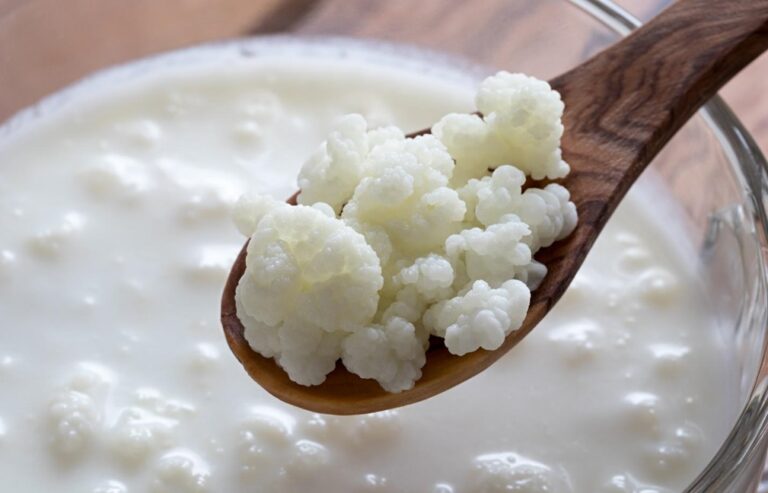Kefir is a form of fermented milk with several advantages, including the potential to improve digestion, decrease cholesterol, and control blood sugar levels. To support some of these assertions, further data is necessary. The Turkish term “keyif,” which describes the “good feeling” one receives after drinking it, is where the name “kefir” originates. Live bacteria and yeast are present in the kefir milk and grain beverage.
Some believe that kefir’s probiotic component makes it potentially healthy. Beneficial bacteria and other microbial species are known as probiotics. Probiotics are currently the subject of preliminary research.
Kefir is a well-liked beverage that promotes digestive health, which is not surprising. Probiotics are “good bacteria” that are known to enhance gut health and may support the body’s digestive functions. The product has around 30 different species of probiotics. Learn more about how good kefir is.
What Exactly Is Kefir?
Kefir is a fermented dairy product. It’s produced by adding cultures of yeast and bacteria to milk. The natural sugars in the milk provide food for the microorganisms. This enables them to develop and make a fermented beverage.
Kefir has a palatable yoghourt-like consistency and a sour, acidic flavour. Kefir may have a faintly carbonated taste due to the fermentation process. This occurs as a result of the bacteria’ production of gases when they break down the milk’s sugars.
What Are Kefir’s Health Advantages?
Due to its many health and wellness benefits, kefir, a traditional food across many cultures worldwide, has gained prominence in the natural healthcare industry. Some of them are as follows:
Rich in Nutrients
Kefir is a dairy product that contains bioavailable protein, fat, and carbohydrates. Additionally, they include essential vitamins A, D, and K, as well as B vitamins and minerals like calcium.
Source of Beneficial Microorganisms and Bioactives
Like yoghurt, kefir uses a broad and varied composition of useful bacteria and yeast. These microorganisms are in charge of creating bioactive substances, which have various positive effects on human health, from enhancing digestion to reducing cholesterol levels.
Provide Protection Against Bacterial Infection
Most of the microorganisms in kefir may serve as an infection defence. They prevent the spread of dangerous strains of E. coli, salmonella, and Helicobacter pylori.
Lower Blood Pressure
According to research on animals, frequent kefir intake may be beneficial for people with high blood pressure. Many processes, including an inhibitory action on the angiotensin-converting enzyme (ACE) and the ensuing relaxing of arteries and veins, are considered responsible for this.
Lower the Risk of Heart Disease
Some potential advantages of kefir for heart health include lowering blood triglyceride and cholesterol levels. Additional study is required to corroborate this and further understand the underlying processes.
Enhance Digestion
Due to its rich microbial composition, several individuals have discovered that drinking kefir regularly helps their digestion. These beneficial bacteria may aid in gut-balancing restoration and enhance the digestive tract’s wellness and functionality.
Potentially Appropriate for Lactose-Intolerant Individuals
There is some proof to indicate that persons who are intolerant of lactose might be able to tolerate kefir since the bacteria that produce lactic acid (LAB) in kefir are mostly responsible for the breakdown of lactose, the natural milk sugar. You must visit your doctor if you believe this might happen to you.
Before introducing fermented foods, those with documented illnesses like inflammatory bowel disease (IBD) or irritable bowel syndrome (IBS) should speak with a doctor or dietician since they may worsen conditions.
Improve Bone Health
The calcium and vitamin K2 included in traditional kefir, prepared from full-fat cow’s milk, benefit bone health.
The bones lose density as we age, increasing the risk of injuries and osteoporosis, particularly in post-menopausal women. Together with other dairy products, kefir may enhance bone density and health.
Lessen Inflammation
Irritable bowel syndrome and rheumatoid arthritis are two illnesses intrinsically characterised by chronic inflammation. Since this is a new field of study, probiotics have been extensively recognised as having anti-inflammatory properties.
Although new research indicates that LAB bacteria are anti-inflammatory, it is currently unclear if this translates into a specific benefit from ingesting kefir.
Have an Impact on Modulating the Immune System
Animal research has shown that kefir consumption improves gut immunity and can reduce the inflammatory reactions linked to allergies and asthma. Further research is still required to fully comprehend the consequences of routine human kefir use, especially in clinical studies.
Types
Kefir comes in a variety of types. People may buy it or produce it by using:
- milk from cows, sheep, or goats
- non-dairy milk, such as oat or coconut milk
- juice
- water
Additionally, several businesses produce flavoured or low-fat kefir drinks.
Kefir’s Nutritional Value
Based on the ingredients and fermenting process, kefir’s nutritional content and the probiotic bacteria it contains might vary greatly. According to a 2017 study, regular kefir milk contains roughly:
- 90% water
- natural sugars at 6%
- 3.5% fat
- protein at 3%
Kefir also has the following minerals and vitamins:
- magnesium
- calcium
- potassium
- vitamin A
- B vitamins
- vitamin C
- vitamin K
Kefir is a probiotic-rich, multifunctional fermented food that also contains healthy minerals. Despite having a reputation for being a nutritious diet, most research on Kefir milk has been done on animals or in labs without any human participants. However, Kefir has shown promise in areas like blood sugar control and intestinal health, and it is often regarded as safe for the majority of people.


Comments are closed.